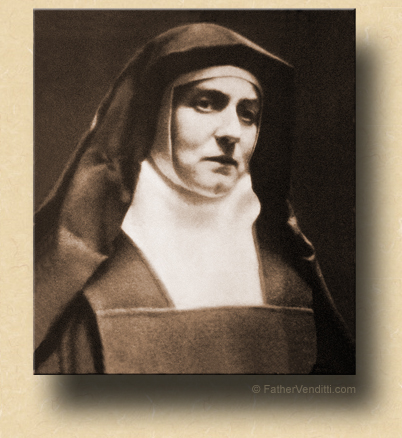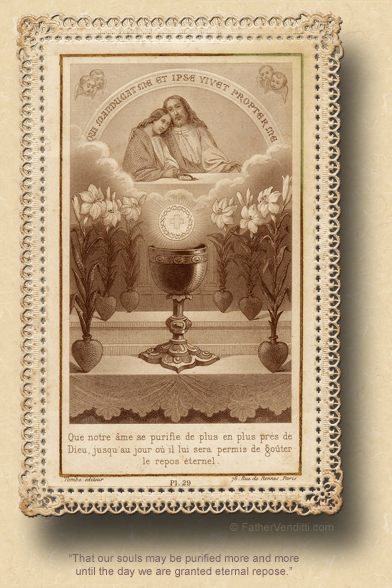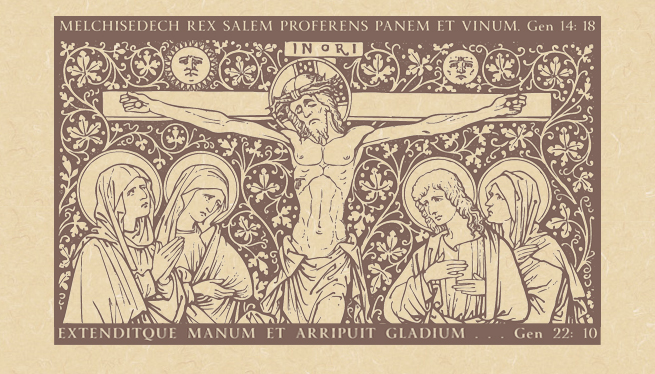But for Wales?
The The Eighteenth Friday of Ordinary Time; or, the Memorial of Saint Teresa Benedicta of the Cross, Virgin & Martyr.
Lessons from the primary feria, according to the ordinary form of the Roman Rite:
• Deuteronomy 4: 32-40.
• Psalm 77: 12-16, 21.
• Matthew 16: 24-28.
|
If a Mass for the memorial is taken, lessons from the feria as above, or any lessons from the common of Martyrs for a Virgin Martyr, or the common of Virgins for One Virgin.
|
The Third Class Vigil of Saint Lawrence, Martyr; and, the Commemoration of Saint Romanus, Martyr.*
Lessons from the proper, according to the extraordinary form of the Roman Rite:
• Ecclesiasticus 51: 1-8, 12.
• Psalm 111: 9, 12.
• Matthew 16: 24-27.
FatherVenditti.com
|
 10:21 AM 8/9/2019 — Today is not only the memorial of Saint Teresa Benedicta of the Cross, it is also the 77th anniversary of the martyrdom of this brilliant philosopher and professor of philosophy known more popularly by her birth name, Edith Stein. She was born in 1891 to Jewish parents in Breslau, Germany, which is now part of Poland. She studied philosophy under Husserl, who was the father—more or less—of a philosophical school of thought known as phenomenology. Husserl's writings would also have a profound influence on a young Karol Wojtyła, who, like Stein, would go on to become a professor of philosophy, among other things. Inspired by the writings of Saint Teresa of Avila, she was baptized on January 1st, 1922, and went on to teach philosophy at several Catholic universities in Germany from 1923 through 1933 until forced to resign due to antisemitic legislation. The very year she resigned her professorship, she entered the Discalced Carmelite convent in Cologne, where she received her religious name of Teresa Benedicta of the Cross. Toward the end of 1939, she was transferred to the convent at Echt, Holland, on account of the Nazi persecution of the Jews; but, in 1942, when Germany occupied the Netherlands, she was arrested and sent to Auschwitz, which is where she met her death. 10:21 AM 8/9/2019 — Today is not only the memorial of Saint Teresa Benedicta of the Cross, it is also the 77th anniversary of the martyrdom of this brilliant philosopher and professor of philosophy known more popularly by her birth name, Edith Stein. She was born in 1891 to Jewish parents in Breslau, Germany, which is now part of Poland. She studied philosophy under Husserl, who was the father—more or less—of a philosophical school of thought known as phenomenology. Husserl's writings would also have a profound influence on a young Karol Wojtyła, who, like Stein, would go on to become a professor of philosophy, among other things. Inspired by the writings of Saint Teresa of Avila, she was baptized on January 1st, 1922, and went on to teach philosophy at several Catholic universities in Germany from 1923 through 1933 until forced to resign due to antisemitic legislation. The very year she resigned her professorship, she entered the Discalced Carmelite convent in Cologne, where she received her religious name of Teresa Benedicta of the Cross. Toward the end of 1939, she was transferred to the convent at Echt, Holland, on account of the Nazi persecution of the Jews; but, in 1942, when Germany occupied the Netherlands, she was arrested and sent to Auschwitz, which is where she met her death.
My undergraduate degree is in philosophy, so I'm familiar with some of her writings, and they are thick going, the kind of books you have to read with a bottle of Excedrin next you just to keep your head from exploding.
Sister Teresa Benedicta of the Cross was canonized and declared a martyr—no surprise—by fellow author of philosophy textbooks, Pope Saint John Paul II, who also declared her co-patroness of Europe, along with Saint Bridget of Sweden and Saint Catherine of Siena.
Turning our attention now to our Scripture lessons:
When I was in the seminary in New York three hundred years ago, it was the custom there for each class to choose a patron saint, and our class raised eyebrows by being the first class to choose a layman, and not a priest, for our patron saint. We chose Saint Thomas More. And if you don't know much about his life and martyrdom, I can recommend the filmed version of Robert Bolt's famous play, A Man for All Seasons.
One of the most moving scenes, toward the end of the film, is when More is on trial, just having heard the perjured testimony of Sir Richard Rich, once More's protege, who testified that he heard More say something treasonous about the king which More never said. And when the time came for him to cross-examine Rich—since defendants against a charge of treason had to defend themselves—he had only one question for his former friend: he asked him what the badge of office was he was wearing; it was the emblem of the Attorney General for Wales. And More's response was, “Why, Richard! It profits a man nothing to give his soul for the whole world; but for Wales?”
He was, of course, quoting our Lord from today's Gospel lesson. And we have to take issue with how the New American Bible has translated it for us. When the New Testament of the New American Bible was revised not long ago, I had hoped that they would correct this passage; but, for whatever reason they didn't.  The Roman Missal Third Edition is, more or less, based on that translation, and there the line reads: “What profit would there be for one to gain the whole world and forfeit his life?” (Matt. 16: 26 RM3). The actual Greek word used in the text is ψυχὴν, which only means “life” in the broadest of senses; what it really means is “inner life” or “soul.” One could translate it simply as “life” if one brought to that translation an understanding that the principle of life in any man is his immortal soul; but, in English we don't often make that connection. The Latin Vulgate uses the word animæ, which clearly means soul, the life-giving principle of a man. Msgr. Knox, whose translation of the Scriptures is my favorite, and who admittedly did not attempt to provide a word-for-word translation but rather tried to convey the best sense of what was being said, gives what I believe is the clearest translation of this verse: “How is a man the better for it, if he gains the whole world at the cost of losing his own soul?” The Roman Missal Third Edition is, more or less, based on that translation, and there the line reads: “What profit would there be for one to gain the whole world and forfeit his life?” (Matt. 16: 26 RM3). The actual Greek word used in the text is ψυχὴν, which only means “life” in the broadest of senses; what it really means is “inner life” or “soul.” One could translate it simply as “life” if one brought to that translation an understanding that the principle of life in any man is his immortal soul; but, in English we don't often make that connection. The Latin Vulgate uses the word animæ, which clearly means soul, the life-giving principle of a man. Msgr. Knox, whose translation of the Scriptures is my favorite, and who admittedly did not attempt to provide a word-for-word translation but rather tried to convey the best sense of what was being said, gives what I believe is the clearest translation of this verse: “How is a man the better for it, if he gains the whole world at the cost of losing his own soul?”
If we accept that translation, which I am prone to do, then it fits in with what we've been observing in the Scripture lessons on and off all this summer: the necessity of always keeping our eyes fixed on heaven. It carries through what we should have noticed when celebrating the Feast of the Transfiguration: how the three Apostles—Peter, James and John—who were privileged to witness the vision of our Lord in heavenly glory, were destined to also be the three present with him during his Agony in the Garden, reminding us that the road to heaven is the Way of the Cross.
And lest you’re tempted to view that as somewhat far-reaching, today our Lord makes what amounts to a direct statement; as Msgr. Knox translates it: “If any man has a mind to come my way, let him renounce self, and take up his cross, and follow me” (16: 24 Knox). There's no ambiguity in that. Combine that with our first lesson today, in which Moses reminds the people of Israel everything that God had done for them, as a way of calling them back to be faithful to the covenant they had made with God. “I remember the deeds of the Lord,” says today’s Psalm; “yes, I remember your wonders of old. And I meditate on your works; your exploits I ponder” (Psalm 77: 12-13 RM3).
And that's where the proper translation of today's Gospel lesson comes into play: God has created us and placed us on this earth for one reason only, and that reason is not to create a perfect Utopian society here on earth, where no one is in need and everyone is happy; we are here to create pure and sinless souls, through prayer and penance and acts of charity, worthy of entering the Kingdom of heaven. And our Lord has told us how to do it: “If any man has a mind to come my way, let him renounce self, and take up his cross, and follow me. The man who tries to save his life shall lose it; it is the man who loses his life for my sake that will secure it” (Matt. 16: 24-25 Knox).

* In the Roman Rite, the concept of a vigil differs completely between the ordinary and extraordinary forms. In the ordinary form, a vigil is simply a celebration of the feast the evening before, either prior to or following First Vespers. In the extraordinary form, the word “vigil” designates the entire day before a First or Second Class Feast, and the Mass on that day takes place in the morning, with the day of vigil having lessons of it's own.
St. Romanus was a Roman soldier who was converted by St. Lawrence. He was beaten and beheaded in the year 261. Because today's vigil is of the Third Class, a Mass for the commemoration is not permitted, with the commemoration being observed by an additional Collect, Secret and Postcommunion added to those of the Vigil.
|

